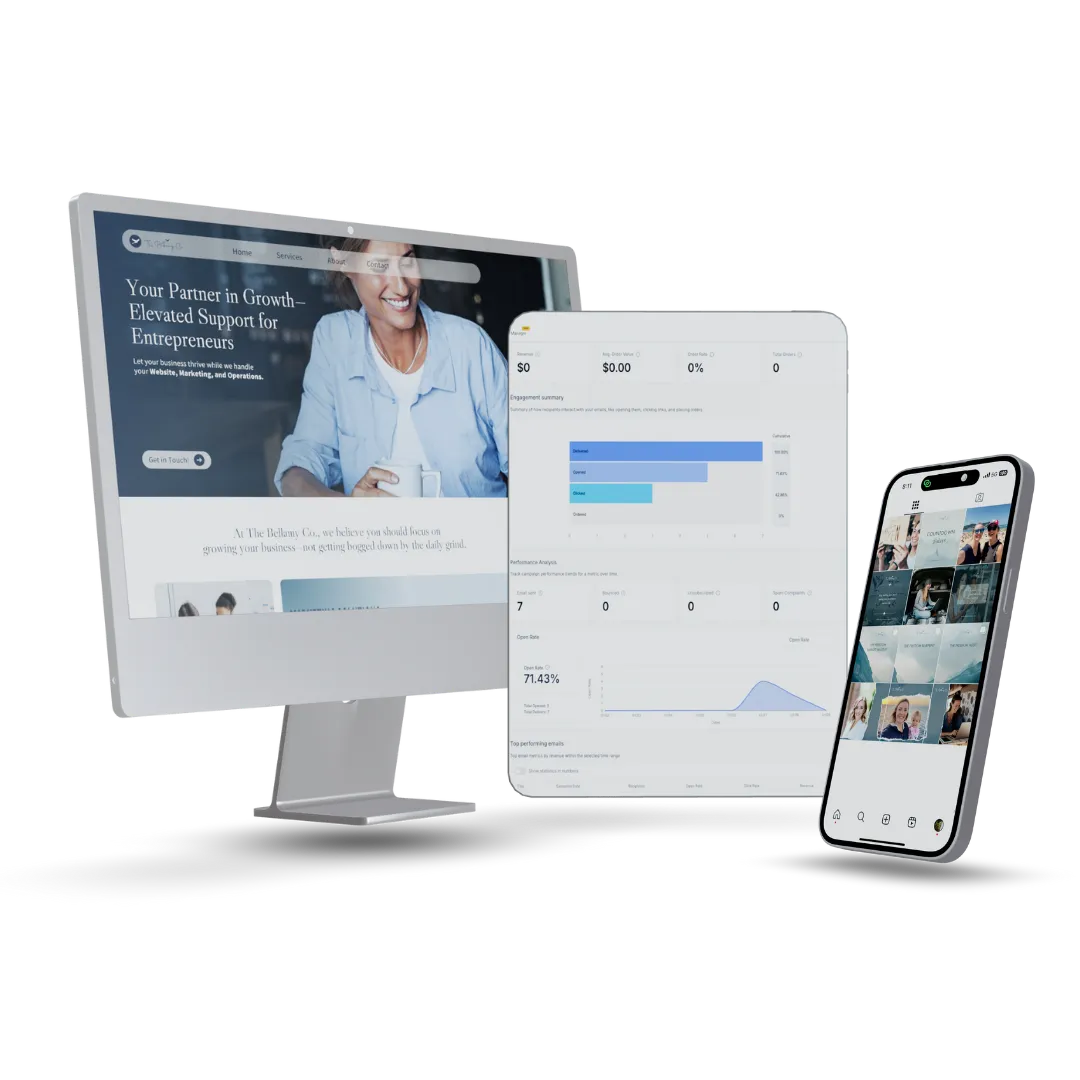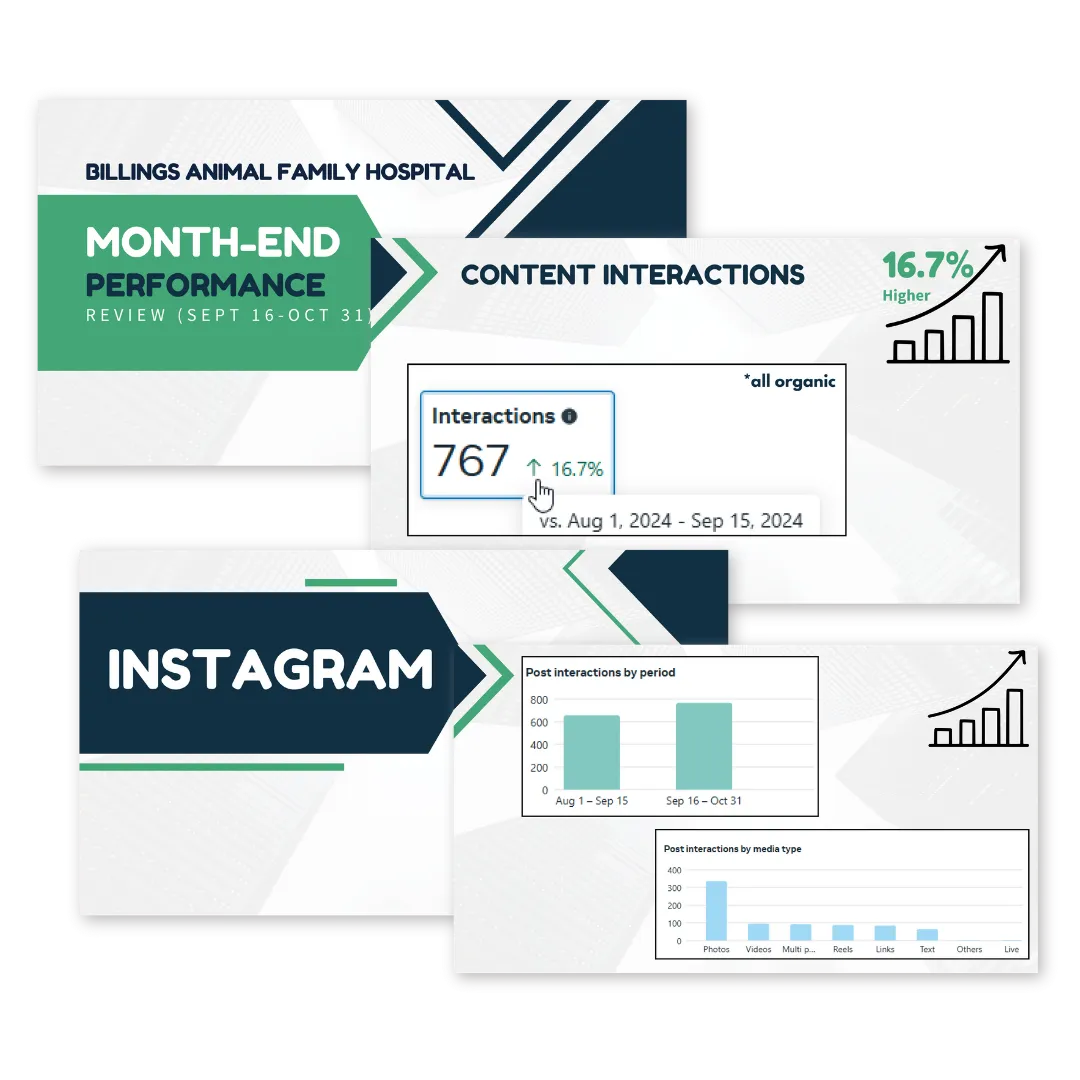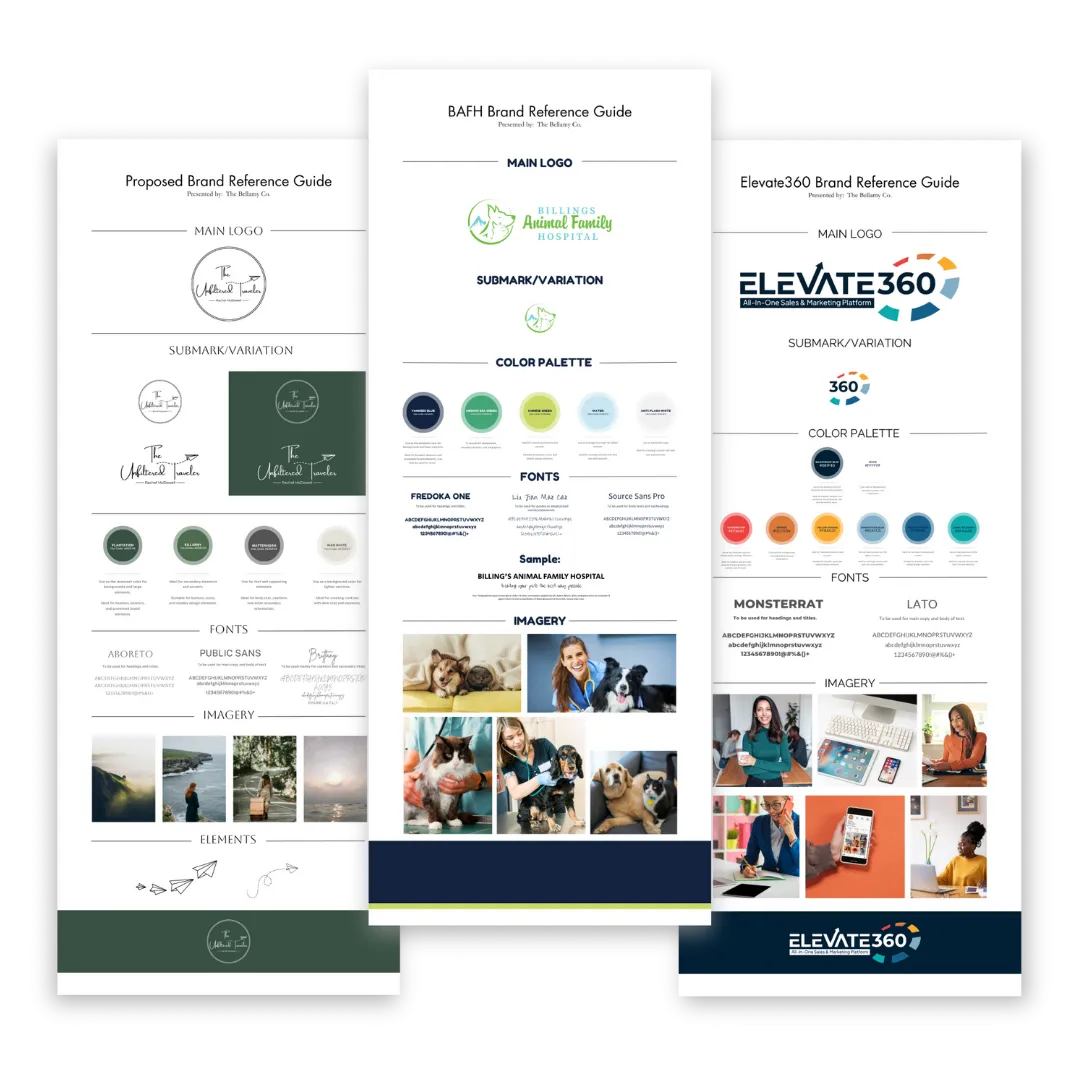Make Your Business Unforgettable
We serve a powerful combination of marketing, operations, and creative solutions that turn businesses into irresistible brands.
Make Your Business Unforgettable
We serve a powerful combination of marketing, operations, and creative solutions that turn businesses into irresistible brands.

Get Your 12-Month Marketing Plan — Tailored to Your Business Model. Free.
Answer a few quick questions about your business and get a fully customized, strategic marketing roadmap — built by our AI marketing engine.
Skip the grind and own the spotlight with digital marketing solutions that let you achieve more with less effort.

MARKETING SOLUTIONS
From websites and email marketing to ads and beyond—we handle it all, so you get maximum results with minimal effort. Focus on tasks you love while we amplify your reach and impact.
Creative Hub
Stand out with a custom website and scroll-stopping social media content. Our Creative Hub brings your brand to life—done for you, effortlessly.
All-in-one Platform
Simplify your marketing and operations with Elevate360. Automate tasks, manage projects seamlessly and keep your business running like clockwork.

Skip the grind and own the spotlight with digital marketing solutions that let you achieve more with less effort.
MARKETING SOLUTIONS
From websites and email marketing to ads and beyond—we handle it all, so you get maximum results with minimal effort. Focus on tasks you love while we amplify your reach and impact.
CREATIVE HUB
Stand out with a custom website and scroll-stopping social media content. Our Creative Hub brings your brand to life—done for you, effortlessly.
ALL-IN-ONE PLATFORM
Simplify your marketing and operations with Elevate360. Automate tasks, manage projects seamlessly and keep your business running like clockwork.
Marketing Solutions at a Glance
Connect with your audience, expand your reach, and achieve measurable growth with a digital marketing agency
that works with you.

Tiktok Ads
Connect with customers through catchy clips

Meta Ads
Attract customers with ads that are made just for them

SEO
Make your website easier to find on Google

Google Ads
Put your business right where people are looking—on Google


Blogs
Engage and draw more visitors to your website

Email Marketing
Send impactful emails that keep them interested and buying.

Backlinks
Get mentioned on other sites and boost your search result
Marketing Solutions at a Glance
Connect with your audience, expand your reach, and achieve measurable growth with a digital marketing agency that works with you.


Tiktok Ads
Connect with customers through catchy clips

Meta Ads
Attract customers with ads that are made just for them

SEO
Make your website easier to find on Google

Google Ads
Put your business right where people are looking—on Google

Blogs
Engage and draw more visitors to your website

Email Marketing
Send impactful emails that keep them interested and buying.

Backlinks
Get mentioned on other sites and boost your search result
Explore Our Creative Suite
As your go-to digital marketing agency, we'll help you craft stunning visuals and compelling content that connect, convert, and elevate your brand.
Branding
Define what your business stands for and how it looks to the world.
Graphic Design
From flyers to business cards, we design beautiful visuals that catch the eye and communicate your message effectively.
Web Design & Development
We build easy-to-use websites that look great and function well.
UI/UX Design
We focus on making your website and apps easy and enjoyable to use.
Illustrations
Add a personal touch with custom drawings that tell your business’s story in a unique way.
Motion Graphics
Bring your content to life with animated graphics that explain your products or services in an engaging way.
Video Editing
We turn your raw footage into professional videos that showcase your business in the best light.
Explore Our Creative Suite
As your go-to digital marketing agency, we'll help you craft stunning visuals and compelling content that connect, convert, and elevate your brand.
Branding
Define what your business stands for and how it looks to the world.
Graphic Design
From flyers to business cards, we design beautiful visuals that catch the eye and communicate your message effectively.
Web Design & Development
We build easy-to-use websites that look great and function well.
UI/UX Design
We focus on making your website and apps easy and enjoyable to use.
Illustrations
Add a personal touch with custom drawings that tell your business's story in a unique way.
Motion Graphics
Bring your content to life with animated graphics that explain your products or services in an engaging way.
Video Editing
We turn your raw footage into professional videos that showcase your business in the best light.
Success Stories that Highlight Productivity
See how our digital marketing solutions help businesses work smarter, streamline operations, and achieve real results.

As a mom-and-pop business that doesn’t have high-level corporate resources, we struggled with customers reserving finite amenities only to change their minds last second and keep us from conducting fluid, reliable sales. We were losing money and had equipment go unrented. We didn’t have a way to make them pay for their reservations, and we had constant disputes concerning terms and conditions.
Since The Bellamy Co. started, they have provided automated solutions that hold the customers accountable to their agreements, process payments, and handle temporary financial holds to ensure we maintain equitable and fair processes. This has drastically increased the efficiency of our reservations and helped us manage the availability of options in a timely manner.

Will & Raven Dodson

Before, it was always going through a middleman, who often relayed the message wrong. With this team, I get to work directly with those working on the project. This was huge for me as a business owner, and things were done right the first time!
I have been able to express my needs and they are met immediately without me having to go back and have them make constant edits. As a business owner, it can be exhausting having to do it all. With them, I don’t have to do that anymore!

Jamie Copeland

I’ve had a number of people ask about who helped me with my website and so I thought I’d share with everyone—shout out to my great friend, Ashley Dwyer and her team at The Bellamy Co.! They were phenomenal every step of the way. If you need someone, think you might need someone or don’t know if you need someone, she’s your girl. You won’t be sad. Definitely recommended!

Rachel Baldwin McDowell

Thank you for great content. I get compliments all the time on how complete, thorough, well done, educational everything is. I really appreciate that.

Dr. Edie Best
Success Stories that Highlight Productivity
See how our digital marketing solutions help businesses work smarter, streamline operations, and achieve real results.

As a mom-and-pop business that doesn’t have high-level corporate resources, we struggled with customers reserving finite amenities only to change their minds last second and keep us from conducting fluid, reliable sales. We were losing money and had equipment go unrented. We didn’t have a way to make them pay for their reservations, and we had constant disputes concerning terms and conditions.
Since The Bellamy Co. started, they have provided automated solutions that hold the customers accountable to their agreements, process payments, and handle temporary financial holds to ensure we maintain equitable and fair processes. This has drastically increased the efficiency of our reservations and helped us manage the availability of options in a timely manner.

Will & Raven Dodson

Before, it was always going through a middleman, who often relayed the message wrong. With this team, I get to work directly with those working on the project. This was huge for me as a business owner, and things were done right the first time!
I have been able to express my needs and they are met immediately without me having to go back and have them make constant edits. As a business owner, it can be exhausting having to do it all. With them, I don’t have to do that anymore!

Jamie Copeland

I’ve had a number of people ask about who helped me with my website and so I thought I’d share with everyone—shout out to my great friend, Ashley Dwyer and her team at The Bellamy Co.! They were phenomenal every step of the way. If you need someone, think you might need someone or don’t know if you need someone, she’s your girl. You won’t be sad. Definitely recommended!

Rachel Baldwin McDowell

Thank you for great content. I get compliments all the time on how complete, thorough, well done, educational everything is. I really appreciate that.

Dr. Edie Best
Spotlight on Success
See why brands trust us as their digital marketing agency to turn bold ideas into standout success.



Spotlight on Success
See why brands trust us as their digital marketing agency to turn bold ideas into standout success.



Flexible Pricing, Tailored Growth
Get powerful marketing and operations support without the hefty price tag. Our pricing model is designed to grow with you:
Single Focus
$697
Per Month
Focus on a single challenge or priority, whether building a brand foundation or amplifying your online presence.
Full Spectrum
$2,497
Per Month
Combine five comprehensive services for an all-inclusive, cohesive approach that propels your business forward.
Triple Impact
$1,597
Per Month
Handpick three core services that best support your objectives, from targeted ads to expert design.
Each plan requires only a three-month commitment, offering you the ultimate flexibility to adapt your services as your business needs change. Grow at your own pace, upgrade or downgrade anytime, ensuring you always have the right tools to succeed.
Flexible Pricing, Tailored Growth
Get powerful marketing and operations support without the hefty price tag. Our pricing model is designed to grow with you:
Single Focus
$697
Per Month
Focus on a single challenge or priority, whether building a brand foundation or amplifying your online presence.
Triple Impact
$1,597
Per Month
Handpick three core services that best support your objectives, from targeted ads to expert design.
Full Spectrum
$2,497
Per Month
Combine five comprehensive services for an all-inclusive, cohesive approach that propels your business forward.
Each plan requires only a three-month commitment, offering you the ultimate flexibility to adapt your services as your business needs change. Grow at your own pace, upgrade or downgrade anytime, ensuring you always have the right tools to succeed.
But for those who demand more than just growth—who seek transformation, strategy, and executive-level guidance,
Executive Strategy & Transformation Package
$7,497
Per Month
This is more than a service package; it’s a
partnership in success, providing you with
Fractional CMO leadership, full-service integration, and priority support to ensure your business doesn’t just grow—it thrives.
This premium package combines top-tier strategic leadership with access to all integrated services to propel your business forward.
But for those who demand more than just growth—who seek transformation, strategy, and executive-level guidance,
Executive Strategy & Transformation Package
$7,497
Per Month
This is more than a service package; it’s a
partnership in success, providing you with
Fractional CMO leadership, full-service integration, and priority support to ensure your business doesn’t just grow—it thrives.
This premium package combines top-tier strategic leadership with access to all integrated services to propel your business forward.
Let Us Help You
Breathe Again!
Simplify Your Growth With The Bellamy Co.
You don’t have to hustle harder. You just need the right support.
Whether you’re just starting your business or ready to scale, The Bellamy Co. is here to help you cut through the overwhelm and build a business that works for you.
Book your free clarity call, and let’s take your first project off your plate.
Work with Us!
From branding to motion graphics, we bring your ideas to life with thoughtful creativity and seamless execution.
Send a Message

